Fiat Vox: For Malika Imhotep, devotion to black feminist study is a life practice
The Ph.D. candidate is interested in how black women and femmes make sense of themselves in a society designed, in many ways, to keep them out. So, she and graduate student Miyuki Baker, started the Church of Black Feminist Thought.
March 12, 2019
Malika Imhotep grew up in West Atlanta, rooted in a community that she calls an “Afrocentric bubble,” in a family of artisans, entrepreneurs and community organizers. Now, as a Ph.D. candidate in the Department of African American Studies at UC Berkeley, she’s studying how black women and femmes make sense of themselves in a society designed, in many ways, to keep them out. “I’m interested in how people create new possibilities for themselves, either inside of mainstream society or outside of it, or underneath it or on top of it.”
But she couldn’t do it alone. She needed to find and nurture a community of thinkers who could aid in the development of her research and her personal journey of discovery. So, she — along with Miyuki Baker, a Ph.D. candidate in theater, dance and performances — started the Church of Black Feminist Thought.
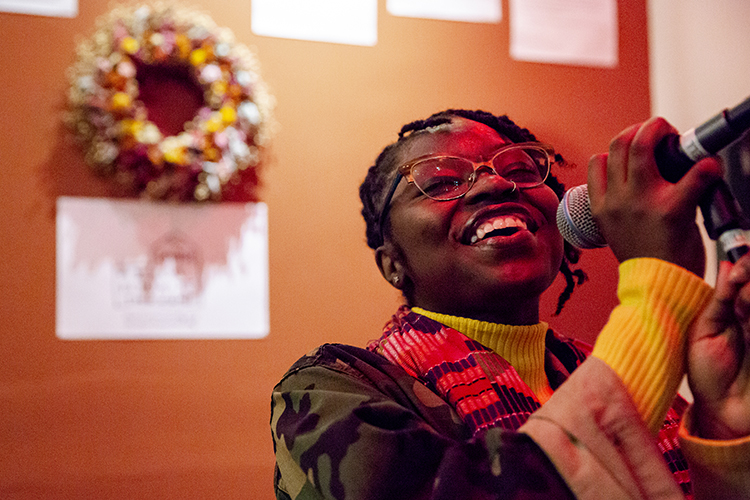
Graduate student Malika Imhotep is studying how black women and femmes make sense of themselves in a society designed, in many ways, to keep them out. (UC Berkeley photo by Brittany Hosea-Small)
Following is a written version of Fiat Vox episode #51: “For Malika Imhotep, devotion to black feminist study is a life practice.”
For Ph.D. candidate Malika Imhotep, devotion to black studies is a life practice.
[Music: “Stucco Grey” by Blue Dot Sessions]
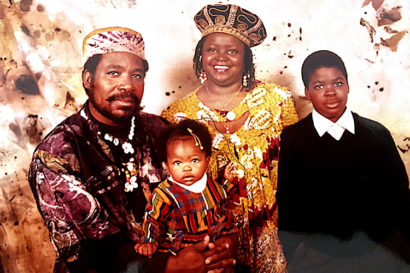
Malika as a baby with her dad, Akbar Imhotep; her mom, D. Makeda Johnson; and her brother, Garvey Imhotep. Not pictured is her older sister, Akilah Walton. (Photo courtesy of Malika Imhotep)
She grew up in West Atlanta, rooted in a community that she calls an “Afrocentric bubble,” in a family of artisans, entrepreneurs and community organizers. Her father was a puppeteer and a writer, and her mother worked as a seamstress, doll maker, social worker and, later, she got involved in local politics.
“I’ve been in and fallen asleep in more community meetings than most people have witnessed,” Malika laughs. “And I think having both of those influences and that exposure to these different ways of getting things done, these different ways of building community, has definitely showed up in the way that I move through the world.”
At UC Berkeley, Malika is studying how black women, or people marked by black femininity, make sense of themselves as new kinds of cultural workers when confronted by social and cultural barriers.
“I’m interested in how people create new possibilities for themselves, either inside of mainstream society or outside of it, or underneath it or on top of it.”

Graduate students Mikyuki Baker and Malika Imhotep started the Church of Black Feminist Thought in 2018. (Art by Miyuki Baker)
Malika knew that she couldn’t explore this on her own, holed up in a library somewhere on campus. She needed to be in the community — to find and nurture a group of thinkers who could aid in the development of her research and her personal journey of discovery.
“It can be violent to just automatically be like, ‘Well, I need to pull you into my academic research,’” says Malika. “It’s like, ‘Nah, I need to pull these resources — these mental resources, these spatial resources, these financial resources — out of here and bring them out to y’all and out to myself, out to another part of myself that’s probably not allowed to be free here.’”
So, Malika, along with Miyuki Baker, a Ph.D. candidate in theater, dance and performance studies, started the Church of Black Feminist Thought.
[Music: “Junca” by Blue Dot Sessions]
[“This is Fiat Vox. I’m Anne Brice.”]
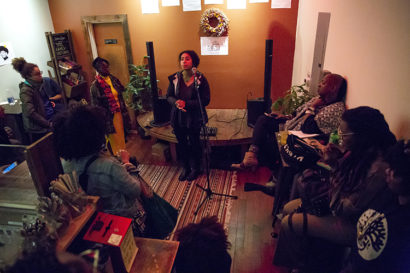
The Church of Black Feminist Thought is an experimental study group where people gather to learn and talk about black feminist teachings. (UC Berkeley photo by Brittany Hosea-Small)
“So, basically, the Church of Black Feminist Thought is an experimental study group where we come together to learn with and think with and honor the work of black women thinkers, artists, writers, dancers, scholars… everything.”
Every month of the 2018-19 calendar year, Malika and Miyuki led a conversation — they call themselves co-conveners — usually with about 30 people interested in learning and talking about the contributions of black women change makers.
They talked about singer Nina Simone and novelist Toni Morrison, Amara Tabor-Smith, a performance artist who teaches dance in the Department of Theater, Dance and Performance Studies and Ula Taylor, chair of the Department of African American Studies, among others.
They first started meeting on campus, then moved to Ashara Ekundayo Gallery in downtown Oakland. And for the month of February, they converted a cafe in North Oakland called the Well into the Black Feminist Study Room.
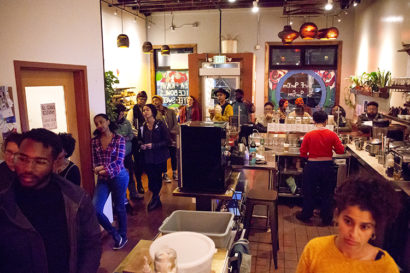
For the month of February, Malika and Miyuki converted a cafe in North Oakland into the Black Feminist Study Room. (UC Berkeley photo by Brittany Hosea-Small)
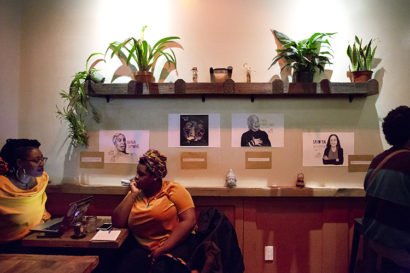
“Miyuki’s and my whole point was to make the teachings of black feminists more accessible,” says Malika. “And to make it something that wasn’t just kind of hemmed up in an ivory tower, or the ebony tower, for that matter.” (UC Berkeley photo by Brittany Hosea-Small)
“Miyuki’s and my whole point was to make the teachings of black feminists more accessible and to make it something that wasn’t just kind of hemmed up in an ivory tower, or the ebony tower, for that matter,” says Malika. “And now, it’s just another exercise in accessibility to say, like, ‘You don’t have to sign up to get on the news list. We’re just going to put it on the walls.’”
At each convening, they start with check-ins, do an embodied meditation, then Malika reads an invocation, introducing the theorist they’re going to discuss. They do free writes and share with the group. They break into small groups and discuss readings and quotes by the person. Then, the group comes back together and talks.
It’s a space, Malika says, where everyone is welcome.
[“True Blue Sky” by Blue Dot Sessions]
“It’s an experiential study group. You don’t have to do all the readings. We just want you to bring yourself in your thoughts. We pull the quotes. We got you. We just want you here.”
Malika and Miyuki have created visual representations of these discussions — something that they call theory maps.
“We’re taking the theory and the words, anything that the community offered us, and putting them together in a way that’s legible to people with all different levels of literacy.”

Theory map of Ula Taylor, chair of the Department of African American Studies (Map created by Miyuki Baker and Malika Imhotep)
And in May, they’re going to publish a theory atlas — a compilation of 12 maps.
For Malika, the atlas represents her deep commitment to building a community that supports and celebrates black women and femmes who are changing the world.
And it’s beginning to answer her questions about how black women care for and make sense of themselves while navigating a society that has been designed, in many ways, to keep them out. She says she’s learned that it takes a commitment to community and a commitment to making beauty out of whatever is available to you.
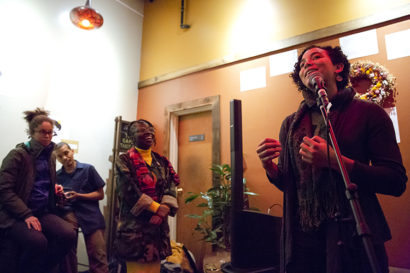
“It’s been such an abundant process,” says Malika. “It’s opened up so much for me.” (UC Berkeley photo by Brittany Hosea-Small)
“It’s been such an abundant process. For me, the work is community. The work is all the people who came with me to install the show last night. The work is the new friends that I’ve made through the process. The work is the way that I personally just been able to grow and develop as a thinker, as an artist. It has opened up so much for me.”
Although the Church of Black Feminist Thought isn’t holding monthly convenings right now, they will continue to be involved in pop-up events and collaborations.
[Music: “Pastel de Nata” by Blue Dot Sessions]
This coming May — with the support of the Southern Exposure Alternative Exposure Grant — they will curate an immersive exhibition at Ashara Ekundayo Gallery titled “Communion: Black Feminism + Spirituality + Study.”
To stay up to date on upcoming events or pre-order an atlas, you can visit the Church of Black Feminist Thought’s website at https://www.blackfeministstudy.org/.
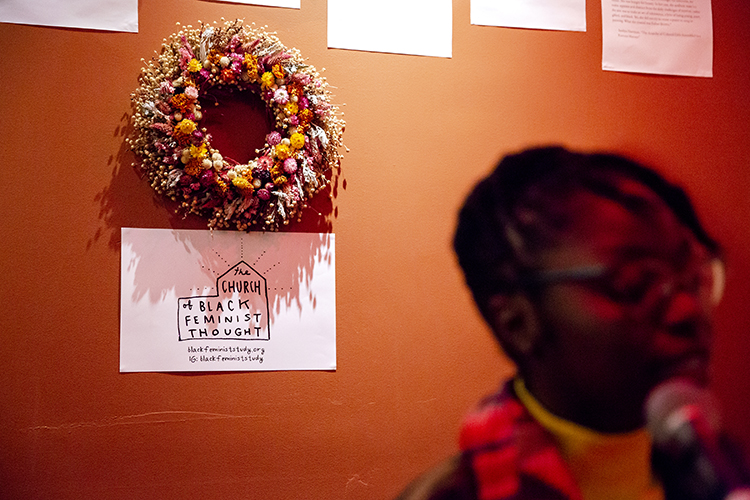
(UC Berkeley photo by Brittany Hosea-Small)

(UC Berkeley photo by Irene Yi)
